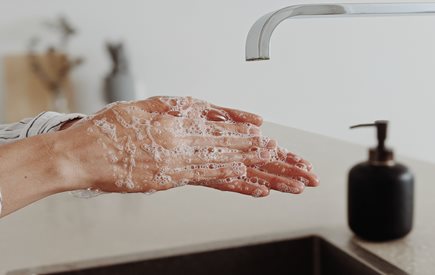Eczema and Frequent Handwashing: Protecting Yourself. Protecting Your Skin.
October is National Eczema Awareness Month
Avoiding certain environmental triggers and irritants (such as household cleaners, soaps and other disinfecting products), and meticulous skin care are crucial to every successful treatment plan for reducing eczema flares. But what do you do to prevent flares when handwashing and the vigorous use of disinfectants are some of the best ways to prevent the spread of viruses like those that cause flu and COVID-19?
What is eczema?
Eczema is a term that encompasses several rash-like skin conditions, including atopic dermatitis and dyshidrotic eczema. It often begins in babies and children before the age of five and may be outgrown, or can remain a chronic issue, flaring periodically throughout life.
“There is possibly no worse feeling than dealing with an itchy rash," said Board Certified Dermatologist and Chief Medical Officer of Advanced Dermatology Mark Kaufmann, MD, who is also an eczema sufferer. "I can really empathize with my patients who have this chronic condition.
"We are fortunate, however, to be living in a time of unprecedented innovation and discovery, and there are now amazing new medications available. Our dermatologists and other clinicians are ready to talk about your concerns, your triggers and all the treatment options that are available.”
In addition to environmental irritants, common triggers might include allergens (such as pets, pollens, dust mites and molds), foods (such as dairy, wheat, eggs, nuts, soy, juices from fresh fruits and vegetables and certain meats and fishes), certain temperatures (especially hot weather with high or low humidity), clothing (wool and synthetic materials that make you sweat), stress and hormones.
Minimizing the effects of frequent handwashing on eczema
For those with eczema, washing your hands as recommended to protect yourself and others from the transmission of viruses can often lead to dry and cracked skin, itchiness, pain and possibly infection.
As a rule, handwashing is less drying than using hand sanitizer. Many antibacterial soaps can be harsh, and the antibacterial elements aren’t necessary to ensure hand hygiene if you wash with soap for 20 seconds, use warm water and so forth. Always remember to pat your skin dry, don’t rub it dry.
Applying moisturizer after each handwashing can offset much of the drying effects of handwashing and help maintain the skin barrier to prevent infections. Once your skin is mostly dry, apply enough moisturizer to cover the surface of your hands and fingers. If possible, carry travel bottles of the soap and moisturizer that work best for you everywhere you go, so you can apply it anywhere. If you can’t wash your hands, the benefit of using hand sanitizer followed by moisturizer outweighs the concerns about irritation. Be certain to clean the outside of your bottles regularly to keep them from collecting harmful germs.
Disposable gloves, changed often, may make sense for some people. Also, always wear gloves when using disinfecting wipes and cleaning products, which can be very harsh on your skin.
Treatments to help eczema inflammation
Therapies for eczema vary based on severity, symptoms, and your preference. Your Advanced Dermatology Dermatologist may suggest:
- Lifestyle changes
- Prescription-strength topical medications, mainly steroids
- Intense Pulsed Light (IPL) treatments, phototherapy
- Oral medications, such as steroids, antibiotics, antihistamines and immunosuppressants
- Alternative and natural therapies
- Participation in clinical trials for the development of new treatments
Your prescribed therapy plan will be developed with your dermatologist or clinician and may include more than one of these alternatives to help you achieve clear, itch-free skin.
Schedule an appointment for your eczema care
Learn more about your eczema care and treatment options. Book an appointment online or call 866.400.3376. If you suffer from atopic dermatitis, you may be eligible to join an Ameriderm Research clinical trial.